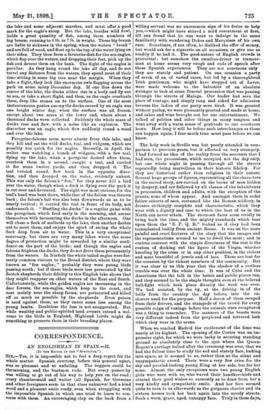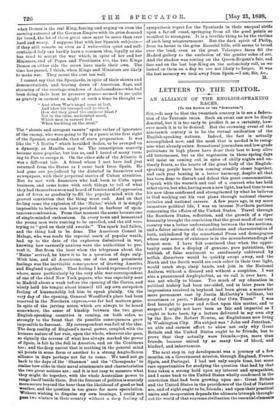CORRESPONDENCE.
AN ENGLISHMAN IN SPAIN.—II.
[TO THY EDITOR OF THE " SPECTATOR."]
Sin,—Yes, it is impossible not to feel a deep regret for the whole matter. Spanish courtesy, before this general upset, was so pleasant and so unfailing. The beggars could be threatening, and the boatmen rude. But every passer-by was willing to go out of his way to help you on the road ; every chambermaid and waiter (all Spanish, for Germans and other foreigners seem in that class unknown) had a kind word and a pleasant smile ready, even when struggling with the impossible Spanish in which one tried to learn to con- verse with them. An encouraging clap on the back from a
willing servant was no uncommon sign of his desire to help you,—which might have stirred a mild resentment at first, till one found that he was wont to indulge in the same familiarity with wandering Dukes and Marquises of his own race. Sometimes, if not often, he disliked the offer of money, but would ask for a cigarette on all occasions, or give one as readily if he had it. The good-nature of English crowds is proverbial ; but somehow the omnibus-driver or tramcar- man at home seems very rough and rude of speech after these Spanish experiences. They are not courteous only they are stately and patient. On one occasion a party of seven of us, of varied races, but led by a thoroughbred Irish gentleman who might have stepped out of Lever, were made welcome to the balconies of an absolute stranger to look at some funeral procession that was passing through the streets of Malaga. Our leader had seen the place of vantage, and simply rang and asked for admission because the ladies of our party were tired. It was granted without parley, we were pleasantly greeted and made at home, and cakes and wine brought out for our entertainment. We talked of politics and other things in many tongues, and went away with a warm sense of gratitude to our courteous hosts. How long it will be before such interchanges as these can happen again, I fear much time must pass before we can know.
The holy week in Seville was but poorly attended in com- parison to previous years, but it affected us very strangely. I had formed no idea of the reality from the accounts that I had seen, the processions, which occupied not the day only, but one whole night in passing through all the streets repeatedly, being marvellous in their historic fidelity. For they are historical rather than religious in their nature. Several huge groups of figures, representing all the characters in the sacred story, are carried on the backs of men hidden by drapery, and are followed by all classes of the inhabitants in procession, children and adults, with the exception of the priests, none of whom appear. And amongst them in order follow cohorts of men, costumed like the Roman soldiery, in dresses strikingly complete and characteristic, which they wear with a dignity and ease to which the best of us in the North can never attain. The stern-set faces seem vividly to bring back the time, and the mighty standards which bear upon them the "S. P. Q. R." looked as if they had been transplanted bodily from ancient Rome. It was on the more painful and cruel features of the story that the images and the representations seemed to me to dwell the most ; and in curious contrast with the simple directness of the rest is the custom of decking out the figure of the Virgin, whether kneeling by the cross or in any other position, in the richest and most beautiful of jewels and of lace. These are lent for the occasion by the richest members of the community. But it was clear to us this year that the shadow of a restless trouble was over the whole time. It was of Cuba and the Americans that the talk in the hotels and public places ran, and they seemed to be the staple thoughts even at the beloved bull-fight which took place directly the week was over. We had assisted, by the by, at the driving in of the bulls from the country the day before, into the en- closure used for the purpose. Half a dozen of them escaped from their drivers, and the stampede of the crowd for every possible coign of vantage before the animals were recaptured was a thing to remember. The manners of the beasts were very different indeed from the perplexed and tortured look which they wear in the arena.
When we reached Madrid the excitement of the time was nearly at its highest. The opening of the Cortes was an im- pressive sight, for which we were lucky in securing standing ground so absolutely close to the spot where the Queen- Regent's carriage halted after the ceremony was over, that we had the fullest time to study the sad and stately face, looking into space, as it seemed to us, rather than at the silent and unsympathetic crowd. There were a very few cries for the shy and puzzled-looking young King at her side, but for her none. Almost the only exceptions were two young English girls who were with us, who waved their handkerchiefs and uttered their good wishes so earnestly as to draw from her a very kindly and sympathetic smile. And her face seemed quite to turn to us afterwards as the gorgeous chariot and its sixteen horses took her back again into the moody streets. Such a worn, grave, aged, unhappy face. Truly in these days, when Demos is the real King, forcing and urging on even the seeming autocrat of the German Empire with its grim demand for bread, the lot of these great ones must be more than ever hard and weary. I suppose that with her Spanish subjects— if they still remain so even as I write—this quiet and self- contained lady can hardly have a common idea, loyally as she has tried to accept the war which, in spite of her and her Ministers, and of Popes and Presidents too, the two Kings Demos on either side the ocean have made their own. The time has passed, I think, when Kings and Ministers are likely to make war. They count the cost too well.
I cannot say that the Spaniards, in spite of their shouts and demonstrations, and tearing down of American flags, and storming of the carriage-windows of Ambassadors—who had been doing their best to preserve peace—seemed to me quite as gravely in earnest as might at such a time be thought :—
" And when War's angel came at last, And blew his trumpet-call to blood, How did they greet the ominous blast ? Not in the calm, undaunted mood, Which men in earnest feel
When buckling on the steel."
The "shouts and arrogant vaunts" spoke rather of ignorance of the enemy, who were going to fly in a panic at the first sight of the Spanish standards, than of stern preparation. It was like the ".A. Berlin" which heralded Sedan, to be avenged on a dynasty, as Manilla may be. The conscription scarcely became more popular, but less so, and I heard of many turn- ing to Pan to escape it. On the other side of the Atlantic it was a different tale. A friend whom I met here had just returned from the States as I came back from Spain. He had gone out prejudiced by the disbelief in financiers and newspapers, with their perpetual stories of Cuban atrocities.
But he met with financiers who had been to Cuba upon business, and came home with such things to tell of what they had themselves seen and heard of famine and of oppression and of fever, as gradually to fill the popular mind with the gravest conviction that the thing must end. And on that feeling came the explosion of the Maine,' which it is simply impossible to believe can have perished in harbour of spon- taneous combustion. From that moment the scene became one of single-minded enthusiasm. In every town and homestead the young men were rushing to be enrolled, and the old were trying to " gird on their old swords." The spark had fallen, and the thing had to be done. The American Consul in Malaga, who was made the especial mark of popular wrath, had up to the date of the explosion disbelieved in war, knowing how earnestly anxious were the authorities to pre- vent it. But from the hour when the telegrams about the ' Maine' arrived, he knew it to be a question of days only.
With him, and all Americans, one of the most prominent feelings was the inevitable consequence of drawing America and England together. That feeling I heard expressed every- where, more particularly by the very able war-correspondent of one of the chief New York papers, who was especially sent to Madrid about a week before the opening of the Cortes, and wisely held his tongue about himself till my own outspoken feeling of kinsmanship led him to speak plainly. On the very day of the opening, General Woodford's place had been reserved in the Northern express,—so far had matters gone. In spite of the jarring notes, which are always to be heard somewhere, the sense of kinship between the two great English-speaking countries is coming, on both sides, so strongly to the front that its possible consequences grow impossible to forecast. My correspondent was full of the idea. The deep reality of England's naval power, coupled with the humane nature of her role, upon the whole, wherever she goes, so signally the reverse of what has always marked the power of Spain, is felt to the full in America, and on the Continent too; and the deep unrest that is seething in the general mind all points in some form or another to a strong Anglo-Saxon alliance in days perhaps not far to come. We need not go back to the days of the Shannon' and the Chesapeake' to realise how alike in their naval attainments and characteristics
the two great nations are; and it is not easy to measure what they might do together, with the whole Australian power to range itself beside them. But the forecast of politics is scarcely more secure beyond the hour than the likelihood of good or bad weather, and the question is too grave for mere speculation. Without wishing to disguise my own leanings, I could not pass two winters in their country without a deep feeling of sympathetic regret for the Spaniards in their unequal strife upon a far-off coast, springing from all the good points so manifest to strangers. It is a terrible thing to be the victims of such long misgovernment. But the dark spirit of Philip, from its haunt in the grim Escorial hills, still seems to brood over the land, even as the great Velasquez faces fill the Madrid gallery to the exclusion of the gentler sides of art. And the shadow was resting on the Queen-Regent's fair, sad face and on the last boy-King on the melancholy roll, as we looked on them on a day we are not likely to forget. It was the last memory we took away from Spain.—I am, Sir, &c.,
M.



































 Previous page
Previous page